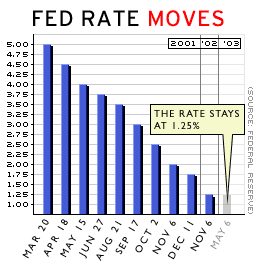NEW YORK (CNN/Money) - Federal Reserve Chairman Alan Greenspan repeated his belief Wednesday that the U.S. economy is poised for stronger growth, though businesses remain cautious and a remote risk of deflation remains.
| 
| |

| 
| 
|

|
 Federal Reserve Chairman Alan Greenspan makes guarded comments about the economy. CNNfn's Kathleen Hays reports. Federal Reserve Chairman Alan Greenspan makes guarded comments about the economy. CNNfn's Kathleen Hays reports.
|
|
Play video
(Real or Windows Media)
|
| 
|

|
|
The central bank chairman, in prepared remarks delivered to the Joint Economic Committee of Congress, said the economy "continues to be buffeted by strong crosscurrents," with weak readings on production and employment, but that stronger financial markets and productivity growth are pointing the way to a rebound.
"Looking ahead, the consensus expectation for a pickup in economic activity is not unreasonable, though the timing and extent of that improvement continue to be uncertain," Greenspan said.
Greenspan again highlighted the risk of an "unwelcome substantial fall in inflation," which he said is minor. After battling inflation for decades, the Fed suddenly is confronted with the prospect of deflation, an unstoppable drop in prices that hurts corporate profits and leads to further economic weakness.

Most economists believe it would take several months of weak economic activity to bring on deflation, and most doubt such a sluggish run is in the cards.
Still, inflation is very low; the 12-month change in the Labor Department's core consumer price index (CPI) was just 1.5 percent in April, the lowest level since the 1960s. Greenspan said the risk of a further drop in prices is greater than the risk of inflation, and that the Fed has been studying ways to combat deflation.
"We at the Fed recognize that deflation is a possibility," he said in response to a lawmaker's question. "We recognize this not as an imminent, dangerous threat, but a threat that, even though minor, is sufficiently large that it does require very close scrutiny and maybe, maybe action on the part of the central bank."
Mum on the dollar
Greenspan pointed to several factors that could fuel an economic rebound, including low interest rates, falling oil prices, an improving stock market, high productivity, and the ability of homeowners to take advantage of low interest rates by refinancing their mortgages.
But he also said the economy's health ultimately will depend on companies deciding to expand their businesses with new investment and hiring.
| Related stories
|

|
|
|
|
"Firms still appear hesitant to spend and hire, and we need to remain mindful of the possibility that lingering business caution could be an impediment to improved economic performance," Greenspan said.
Greenspan did not list the recent decline in the dollar's value as one of the stimulative factors for the economy, though many economists think a controlled drop in the greenback will fight deflation and boost U.S. exporters' profits.
The Bush administration has claimed to support a strong dollar, but Treasury Secretary John Snow has made comments recently indicating the administration wasn't losing any sleep over the dollar's diminished clout.
Both Greenspan and Snow probably want to avoid an uncontrollable decline in the dollar, which would cause foreign investors to flee U.S. assets, driving down stock prices, driving up interest rates and undercutting the economy.
Greenspan refused to comment on the dollar during the question-and-answer session. His testimony had little impact on U.S. stock prices, which fell in midday trading. Treasury bond prices also fell.
No hint of a cut
To combat the effects of a recession and terrorist attacks in 2001, the Fed cut its target for its key short-term interest rate 11 times. It cut the rate again in late 2002, as a hesitant recovery seemed to weaken in the months leading up to a U.S.-led war with Iraq.
Since then, the Fed has repeatedly expressed cautious optimism and said any weakness in the economy likely was due to uncertainty in the walk-up to war. Once these "geopolitical uncertainties" were gone, the Fed hoped, businesses would make long-term planning and hiring decisions, goosing the economy.
But economic data after the war have continued to disappoint, leading some economists to wonder if the Fed will be forced to cut rates again at its next policy meeting, scheduled for June 24-25.
Greenspan's testimony, however, gave little indication that he is any more worried about the economy than he was before the May 6 policy meeting, when the Fed left rates alone.
"[His testimony] leaves us thinking that a June 25 easing is far from a done deal -- it will depend on the data," said Ian Shepherdson, chief U.S. economist at High Frequency Economics Ltd.

|

